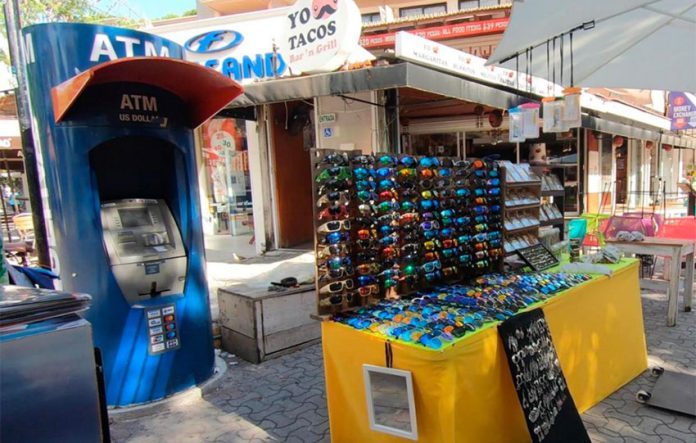An international investigation has revealed that a Romanian criminal organization stole millions of dollars for several years by placing ATMs equipped with skimmers in popular tourist destinations throughout Mexico.
A former gang member said that earnings from the cloned cards created by the skimming process averaged US $20 million per month, according to the report by the Organized Crime and Corruption Reporting Project (OCCRP), Mexicans Against Corruption and Impunity (MCCI), the Quinto Elemento Lab and the Romanian RISE Project.
Their investigation found that the Romanian crime syndicate has been operating in Mexico since 2014, when the gang formed a font company, Top Life Servicios, and persuaded the Mexican bank Multiva to allow them to install their Intacash brand of cash machines.
The OCCRP said the bank is owned by Olegario Vázquez Aldir, a member of one of the wealthiest families in Mexico and an appointed member of President López Obrador’s business advisory council. Multiva renewed its contract with the Romanians in 2018.
The gang’s alleged leader, 43-year-old Florian “The Shark” Tudor, was identified in a separate investigation conducted by journalist Bryan Krebs in 2015, but Tudor has repeatedly denied he engages in criminal activity, claiming he is only a businessman who refuses to be extorted by the police.
Krebs discovered that Bluetooth devices had been placed inside the ATMS to clone the cards and that members of the syndicate needed only to walk up to the tampered cash machines with a cell phone to download the stolen data. Using a burner phone, Krebs found compromised machines in Cozumel, Playa del Carmen and Tulum, including in his own Cancún hotel.
When Tudor and his bodyguard, Constantin Sorinel Marcu, who was murdered in 2018, got wind of Krebs’ reporting they were incensed. “They destroyed us. That’s it. Fuck his mother. Close everything,” Tudor allegedly told Marcu via a messaging app. He then ordered Marcu to kill whoever was responsible for leaking information. The bodyguard acquiesced. “OK, I can kill them. Any time, any hour.”
The OCCRP’s investigation, which includes Krebs’ findings, claims that Tudor’s gang purchased Chinese ATMs and doctored them to clone tourists’ debit cards which were then used to make withdrawals in Mexico, Indonesia, India, Barbados, Granada, Paraguay, Brazil, Japan, South Korea and Taiwan in amounts totaling upwards of $1.2 billion.
Experts say Mexican ATMs need stronger regulation. Currently, banks are responsible for investigating themselves when their ATMs are tampered with.
“We realized that there is a legal vacuum,” said Mario Di Costanzo, former head of Condusef, a federal protection agency for financial consumers. “No one supervises them.”
Tudor is also under an investigation opened in January of this year by police in Romania for his activities as leader of an organized crime syndicate, which they allege includes threats, assault, blackmail and murder.
Tudor denies this as well. As he told OCCRP, “I have never killed anyone and I have never ordered anyone killed.” He and is associates are living as free men in Mexico, although Multiva suspended its contract with Intacash in 2019 and no longer processes their banking transactions.
OCCRP-affiliated journalists in Mexico, the United States and Romania spent eight months researching and writing the report, which involved the analysis of over 15,000 pages of documents.
Source: El Financiero (sp), Aristegui Noticias (sp)
